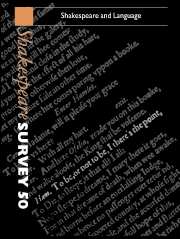Book contents
- Frontmatter
- Shakespeare’s Language and the Language of Shakespeare’s Time
- ‘I’ll plague thee for that word’: Language, Performance, and Communicable Disease
- The Language of the Spectator
- Marlowe’s Edward II: Penetrating Language in Shakespeare’s Richard II
- Hamlet’s Ear
- Secrecy and Gossip in Twelfth Night
- Shakespeare Rewriting Ovid: Olivia’s Interview with Viola and the Narcissus Myth
- ‘Voice Potential’: Language and Symbolic Capital in Othello
- Household Words: Macbeth and the Failure of Spectacle
- Erring and Straying Like Lost Sheep: The Winter’s Tale and The Comedy of Errors
- The ‘Shakespearian Gap’ in French
- Reading the Early Modern Text
- Shakespeare and the Metamorphosis of the Pentameter
- Rereading Illustrations of the English Stage
- Nietzsche’s Hamlet
- ‘Strange and woonderfull syghts’: The Tempest and the Discourses of Monstrosity
- Shakespeare Performances in England, 1996
- Professional Shakespeare Productions in the British Isles, January–December 1995
- 1 Critical Studies
- 2 Shakespeare’s Life, Times, and Stage
- 3 Editions and Textual Studies
- Books Received
- Index
‘I’ll plague thee for that word’: Language, Performance, and Communicable Disease
Published online by Cambridge University Press: 28 March 2007
- Frontmatter
- Shakespeare’s Language and the Language of Shakespeare’s Time
- ‘I’ll plague thee for that word’: Language, Performance, and Communicable Disease
- The Language of the Spectator
- Marlowe’s Edward II: Penetrating Language in Shakespeare’s Richard II
- Hamlet’s Ear
- Secrecy and Gossip in Twelfth Night
- Shakespeare Rewriting Ovid: Olivia’s Interview with Viola and the Narcissus Myth
- ‘Voice Potential’: Language and Symbolic Capital in Othello
- Household Words: Macbeth and the Failure of Spectacle
- Erring and Straying Like Lost Sheep: The Winter’s Tale and The Comedy of Errors
- The ‘Shakespearian Gap’ in French
- Reading the Early Modern Text
- Shakespeare and the Metamorphosis of the Pentameter
- Rereading Illustrations of the English Stage
- Nietzsche’s Hamlet
- ‘Strange and woonderfull syghts’: The Tempest and the Discourses of Monstrosity
- Shakespeare Performances in England, 1996
- Professional Shakespeare Productions in the British Isles, January–December 1995
- 1 Critical Studies
- 2 Shakespeare’s Life, Times, and Stage
- 3 Editions and Textual Studies
- Books Received
- Index
Summary
FOREIGN BODIES
Jacobean drama begins – like a Beckett or Pinter play ante litteram – with a pause. In his patent creating the company of the King’s Servants, on 19 May 1603, the as yet uncrowned King James I was obliged to insert a holding clause, putting off his players’ dramatic displays to more propitious times: ‘and the said comedies, tragedies, histories, interludes, morals, pastorals, stage plays, and such like to show and exercise publicly to their best commodity when the infection of the plague shall cease.’ Now James may appear, in his diligent cataloguing of the postponed dramatic genres, to be echoing Polonius, but for the first months of the new reign it was not pastoral or pastoral-comical or tragical-comical-historical pastoral that dominated the stage, but tragical-historical pastuerella pestis, the bacillus of the bubonic plague, in its most virulent visitation since the Middle Ages.
This was an inauspicious start not only for the King's Men but also for the King's person, whose ceremonial progress from the north, conducted by horses, was upstaged by the triumphal entry from the east of another powerful foreign body, conducted by rats. The two rival bodies, Rex Britanniae and Rattus rattus, or rather the pathogenic micro-organisms carried by the parasitic riders of the unwitting rodent, first crossed paths in North London in the month of April. Even the superstitious James might have preferred to have his path crossed by a black cat than by a black rat, had he had the epidemiological know-how to know why.
- Type
- Chapter
- Information
- Shakespeare Survey , pp. 19 - 28Publisher: Cambridge University PressPrint publication year: 1997
- 1
- Cited by



